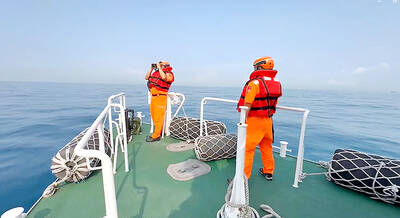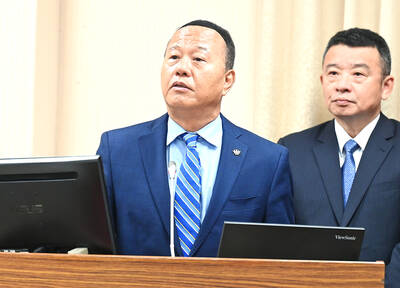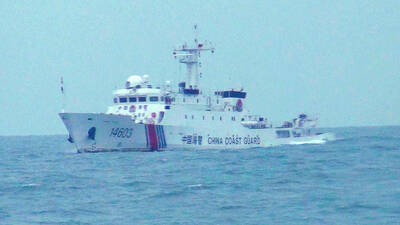The Transitional Justice Commission on Sunday announced that it would investigate the death of democracy and human rights advocate Chen Wen-chen (陳文成), as well as other unresolved cases that were allegedly politically motivated, with the help of tens of thousands of political documents.
Chen was found dead 37 years ago today next to what is now National Taiwan University’s (NTU) Department of Library and Information Sciences building, after having been questioned by Taiwan Garrison Command officers the day before.
Born in 1950 and an NTU graduate, Chen was an assistant professor at Carnegie Mellon University when he returned to Taiwan on May 20, 1981, to visit his family.
The Dr Chen Wen-chen Memorial Foundation has said that its investigations found that Chen was questioned about overseas students who had allegedly served as informants for the then-Chinese Nationalist Party (KMT) regime.
The officers questioned Chen about his establishment of a foundation in the US to fundraise for the now-defunct pro-democracy Formosa Magazine, the foundation said.
Although US forensic doctors found signs of torture on Chen’s body, the garrison command claimed that Chen committed suicide, the foundation said.
The justice commission’s investigation of Chen’s case, the murder of veteran pro-democracy campaigner Lin I-hsiung’s (林義雄) mother and twin daughters in 1980 and other allegedly political cases would be deeper and more specific than what has been done until now, commission Deputy Chairperson Chang Tien-chin (張天欽) said.
The commission is to conduct a comprehensive investigation of the assailants and systems of accomplices during the period of authoritarian rule, he said.
The commission would not only clarify the role of Chiang Kai-shek (蔣介石), but also the complicated structures that made such violence possible, he added.
The commission has reportedly already sought the cooperation of the Ministry of Justice’s Investigation Bureau, which is to provide the commission with documents for investigation.
Media have reported that the commission would begin by selecting 10,000 out of 30,000 documents that it believes merit investigation and pick out any documents relevant to the cases.
Since its official launch on May 31, the commission has received more than 40 letters of appeal from the public, an unnamed government official said.
Most of the letters were written by people seeking redress for injustices, followed by people hoping to remove authoritarian symbols, the source said, adding that the letters show that the public has high hopes for the commission.

GOOD DIPLOMACY: The KMT has maintained close contact with representative offices in Taiwan and had extended an invitation to Russia as well, the KMT said The Chinese Nationalist Party (KMT) would “appropriately handle” the fallout from an invitation it had extended to Russia’s representative to Taipei to attend its international banquet last month, KMT Chairman Eric Chu (朱立倫) said yesterday. US and EU representatives in Taiwan boycotted the event, and only later agreed to attend after the KMT rescinded its invitation to the Russian representative. The KMT has maintained long-term close contact with all representative offices and embassies in Taiwan, and had extended the invitation as a practice of good diplomacy, Chu said. “Some EU countries have expressed their opinions of Russia, and the KMT respects that,” he

An increase in Taiwanese boats using China-made automatic identification systems (AIS) could confuse coast guards patrolling waters off Taiwan’s southwest coast and become a loophole in the national security system, sources familiar with the matter said yesterday. Taiwan ADIZ, a Facebook page created by enthusiasts who monitor Chinese military activities in airspace and waters off Taiwan’s southwest coast, on Saturday identified what seemed to be a Chinese cargo container ship near Penghu County. The Coast Guard Administration went to the location after receiving the tip and found that it was a Taiwanese yacht, which had a Chinese AIS installed. Similar instances had also

VIGILANCE: The military is paying close attention to actions that might damage peace and stability in the region, the deputy minister of national defense said The People’s Republic of China (PRC) might consider initiating a hack on Taiwanese networks on May 20, the day of the inauguration ceremony of president-elect William Lai (賴清德), sources familiar with cross-strait issues said. While US Secretary of State Anthony Blinken’s statement of the US expectation “that all sides will conduct themselves with restraint and prudence in the period ahead” would prevent military actions by China, Beijing could still try to sabotage Taiwan’s inauguration ceremony, the source said. China might gain access to the video screens outside of the Presidential Office Building and display embarrassing messages from Beijing, such as congratulating Lai

Four China Coast Guard ships briefly sailed through prohibited waters near Kinmen County, Taipei said, urging Beijing to stop actions that endanger navigation safety. The Chinese ships entered waters south of Kinmen, 5km from the Chinese city of Xiamen, at about 3:30pm on Monday, the Coast Guard Administration said in a statement later the same day. The ships “sailed out of our prohibited and restricted waters” about an hour later, the agency said, urging Beijing to immediately stop “behavior that endangers navigation safety.” Ministry of National Defense spokesman Sun Li-fang (孫立方) yesterday told reporters that Taiwan would boost support to the Coast Guard